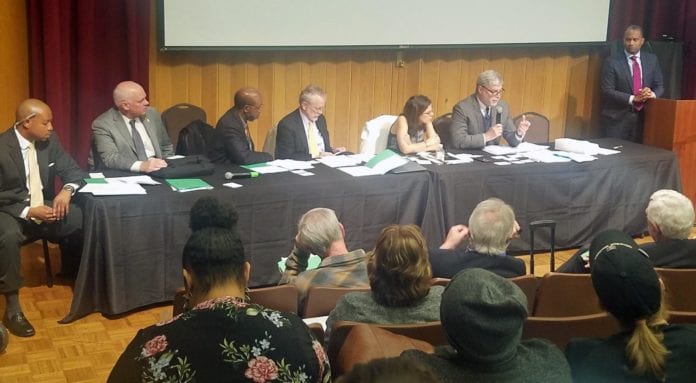Pointed questions from local activists – some asserting Memphis Police Department officers still were surveilling them – punctuated the second public forum hosted by a special team monitoring local compliance with a federal consent decree.
Crafted in 1978, the Kendrick Consent Decree is an agreement between the City of Memphis and the American Civil Liberties Union (ACLU) prohibiting the gathering of “political intelligence” on citizens assembled at a lawful protest.
With Mississippi Boulevard Christian Church in Midtown as the setting on Thursday evening, court-appointed monitor Edward L. Stanton III and his team began a narrative of their objectives and activities. That move morphed into a back-and-forth with activists, who asserted they still were surveillance targets of the Memphis Police Department (MPD).
U.S. Western District Judge Jon P. McCalla appointed Stanton and his team in December of 2018. They have the responsibility of monitoring whether the city is living up to the 41-year-old decree.
In 2017, after a list surfaced of people not allowed into City Hall unless they had a police escort, the ACLU filed suit. Many involved in legal protests were on that list before they subsequently were taken off. A three-day trial resulted in McCalla deciding that MPD had run afoul of the consent decree.
Specifically noted was political surveillance by MPD of activists and protesters. MPD’s out-of-order posture also featured use of a fake Facebook account
Several activists questioned why they could not be a part of the monitoring team.
“There are ways for you to get involved, and we encourage you to get involved,” said Stanton. “Focus groups and individual meetings have been set up to meet with us. All you have to do is contact us. We assure you that your comments and suggestions are not falling on deaf ears. We want to build trust between the monitoring team and the community, but ordinary citizens cannot participate on the monitoring team.”
John C. Henegan, the monitoring team expert in constitutional law and the First Amendment, detailed the consent decree’s prohibitions.
“The City of Memphis and the police department are prohibited from gathering, indexing, filing or storing any type of political intelligence. There may not be electronic interceptions if no criminal conduct is involved. There may be no infiltration or informants used in deterring first amendment rights. There can be no spread of defamation. There can be no recording of names, photos, or license plates of individuals gathering lawfully.”
In his weekly update distributed Friday (Nov. 8), Mayor Jim Strickland outlined three scenarios as he made the point that there are “potentially significant challenges caused by the restrictions laid out in the Decree.” The decree, he said, “can potentially limit MPD’s ability to proactively use technology to keep everyone safe.”
Al Lewis, with the Coalition of Concerned Citizens, questioned the monitor’s effectiveness in enforcing the decree.
“What about the information that has already been gathered on us,” he asked. “What about the dissemination of that information? If the information is supposed to be destroyed, how can that be checked? My information was shared with St. Jude, FedEx, and Autozone. Does the decree have the power to make those companies destroy the information they have already received from the city and the police?”
Lewis and others in his group took issue with language that indicated gathering of intelligence was prohibited, except in the case of a criminal investigation.
“Who determines what is ‘political,’ one person asked? “And who determines what is criminal?”
The team gave no definitive answer for that.
“We understand all of your concerns, and we will do every thing in our power to get you the answers to those questions,” Stanton said to attendees.
When several activists told the panel that the violations prohibited by police were still happening, Stanton asked them to contact his office to meet about the alleged violations.
(For more information, visit memphispdmonitor.com.)



